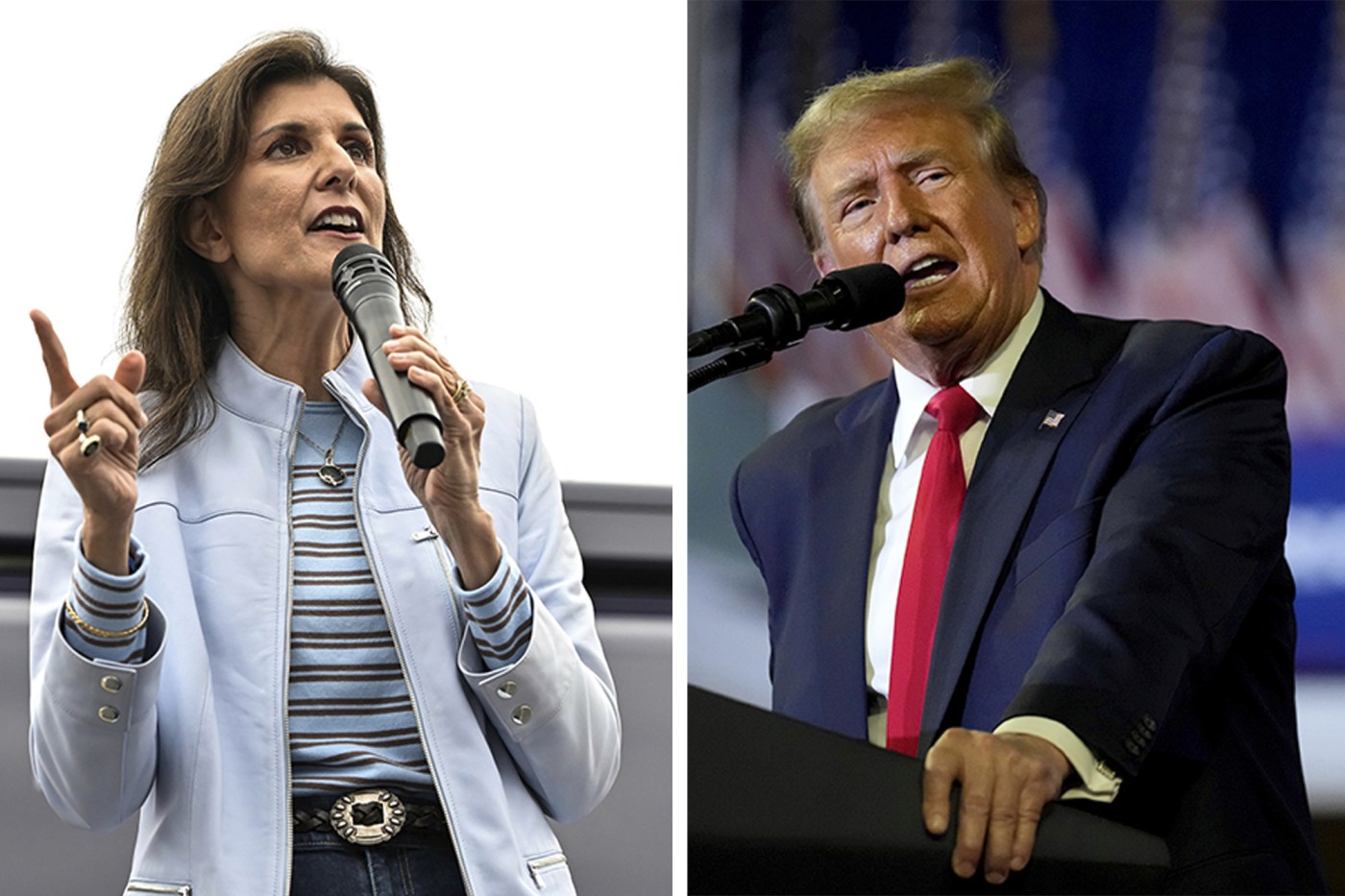
South Carolina’s Republican primary: What to watch as Haley tries to upset Trump in her home state
COLUMBIA, S.C. (AP) — Nikki Haley ‘s best-case scenario for her home state’s Republican primary might be to do well enough to make the March 5 Super Tuesday slate somewhat competitive against Donald Trump.
An upset in South Carolina, though, is a longshot in a state where Republicans like their former governor but love the former president.
Trump is looking to complete an early state sweep after scoring big wins in Iowa, New Hampshire and Nevada. For Haley, who was twice elected South Carolina governor and then served as Trump’s U.N. ambassador, she has a chance to narrow the margin and dampen Trump’s momentum.
Here’s a look at what to watch in Saturday’s primary.
Can Donald Trump deliver another home-state knockout?
Nikki Haley circled Feb. 24 on her calendar months ago. Her bid always hinged on building support through the first three contests and then, as she told voters in Iowa and New Hampshire, winning “my sweet state of South Carolina.”
Republican presidential candidate former President Donald Trump and moderator Laura Ingraham gesture on stage during a Fox News Channel town hall Tuesday, Feb. 20, 2024, in Greenville, S.C. (AP Photo/Chris Carlson)
She has recalibrated recently. Rather than predict victory, she talks of how far she’s come and promises to continue to Super Tuesday. “There were 14 candidates in this race,” she says. “I’ve defeated 12 of the fellas, and I have just one more to catch up to.”
Trump shrugs it off, predicting at a Fox News town hall that he would win “bigly.”
“Everybody knows you can’t lose your home state,” he said.
There’s a certain déjà vu to it all that should give Haley pause. In 2016, three Trump rivals made home-turf primaries their points of pride. Two even won: then-Ohio Gov. John Kasich and Texas Sen. Ted Cruz. Trump sailed to the nomination anyway.
Florida Sen. Marco Rubio, meanwhile, stuck around until his home-state primary, which followed Trump’s Super Tuesday domination. Rubio got thrashed — and that was before Trump had made the Mar-a-Lago estate in Palm Beach his permanent residence.
Will independents and Democrats make the race close — or closer?
South Carolina has no party registration, and Republicans hold an open primary. That means the only voters who are not eligible Saturday are the 126,000 or so who cast Democratic primary ballots on Feb. 3. That’s significantly less than the 500,000-plus who voted Democratic in 2020, meaning plenty of anti-Trump votes are theoretically available to Haley.
Related Articles
Howie Carr: It’s a migrant free-for-all
Biden calls Putin ‘crazy SOB’ and steps up attacks on Trump
Dueling pro-Trump factions in Michigan throw the swing state’s Republicans into disarray
What to expect in the South Carolina Republican presidential primary
Trump faces warning signs that his fundraising prowess may have limits in 2024 campaign
She has not explicitly asked Democrats to help. But she steps right up to the line, telling every audience about open primary rules as she tries to build a wide coalition.
Haley touts her conservative credentials — enacting tax cuts and a voter identification law as governor — while recalling her bipartisan coordination to take down the Confederate banner from state Capitol grounds after a racist massacre at a Charleston church in 2015. She hammers the 77-year-old Trump as chaotic and washed-up but says she voted for him twice and was proud to serve as his U.N. ambassador. She calls herself “pro-life” but does not “judge anyone who is pro-choice” and is not calling for a national abortion ban.
That may be the only rational strategy to defeat Trump. It also could leave Haley without a natural base.
“She ran for governor as a tea party ally, and then she became one of the same good ole boys,” insisted Tim Foster, a Trump supporter and retired deputy sheriff from Spartanburg. Foster took Haley to task, especially for taking down the Confederate battle flag: “She’s a very different person now than she was when I voted for her.”
Antjuan Seawright, a top Democratic campaign veteran, meanwhile, said Democrats, especially Black voters who anchor the party in South Carolina, take Haley at her word when she scoffs at people calling her a “moderate.”
“We remember who Nikki Haley was,” Seawright said, including her positions on the battle flag before the Charleston killings. “The only reason that flag came down is because of that tragedy … We aren’t saving her from Donald Trump. There’s an old saying that fits here: What goes around often comes around.”
Can Haley get Joe Biden’s Charleston-Columbia coalition?
If Haley makes it close, the precincts to watch are in metro Charleston and greater Columbia. Those are places Trump did not carry in the 2016 primary, even though he swept South Carolina’s 50 delegates. Columbia and its suburbs are home to a diverse population, including Black voters, university students and college-educated whites — in short, the coalition that helped President Joe Biden defeat Trump in 2020.
Republican presidential candidate former UN Ambassador Nikki Haley speaks during a campaign event Wednesday, Feb. 21, 2024, in North Augusta, S.C. (AP Photo/Chris Carlson)
The Charleston area stands out for its moderates. When Biden won the 2020 Democratic primary in South Carolina, his support from Black voters got most of the attention. But he drew critical backing from Charleston’s white voters who hail from the ideological middle of the electorate that does not align with Trump.
Call them Biden Republicans or Haley Democrats or some combination. But if Haley is going to narrow Trump’s margin, she needs a similar boost from the same kinds of voters.
Do Trump’s comments on veterans linger?
Trump asked recently where Haley’s husband has been on the campaign trail. The answer: Maj. Michael Haley is deployed with the South Carolina Army National Guard. He has served previously in Afghanistan.
Haley pounced on the comment. Retired Brig. Gen. Don Bolduc, who already had been traveling with Haley, made emotional pleas in his introductions of the candidate, recounting Trump’s history of mocking veterans, including 2008 GOP nominee and Vietnam POW John McCain.
“That is not what presidents do. It’s absolutely wrong,” Bolduc said of Trump, who took multiple medical and student deferments during Vietnam. “It tears us apart.”
Republican presidential candidate former President Donald Trump looks to Sen. Tim Scott, R-S.C., during a Fox News Channel town hall Tuesday, Feb. 20, 2024, in Greenville, S.C. (AP Photo/Chris Carlson)
The immediate question is how many South Carolina veterans react like Bob Crawford, who retired after 36 years in the Navy. “It’s an insult to every service member that’s on active duty, and he’s an insult to this country,” said Crawford, who voted for Trump in 2016 and, reluctantly he said, in 2020. Not this time, Crawford explained, after attending a Haley rally: “She convinced me.”
Regardless of whether Trump has any consequences in South Carolina, it is worth remembering the latest barbs because they give fresh material to Biden and Democrats for the general election campaign.
“If it’s a rematch, I’ll vote for Biden,” Crawford said.
How do Trump and Haley handle the results?
When Haley got to 43% of the vote in New Hampshire, she celebrated as if she had won. And Trump got angry, accusing her of lying to voters.
Trump has mellowed since. Asked in a Fox News town hall Tuesday why Haley has not withdrawn, he was matter of fact: “I don’t think she knows how to get out.”
To be clear, Haley insists she is staying at least through Super Tuesday, maybe longer. “We don’t do coronations in America,” she has said often in South Carolina.
The tone Tuesday night, if Haley indeed sticks around, could set the course for the rest of the primary campaign, however long it lasts.
Republican presidential candidate former UN Ambassador Nikki Haley speaks during a campaign event Wednesday, Feb. 21, 2024, in North Augusta, S.C. (AP Photo/Chris Carlson)
Be wary, though, of predictions about what an extended primary means for the fall. In 2016, Democratic runner-up Bernie Sanders waged a bitter fight with nominee Hillary Clinton well after she amassed an insurmountable delegate lead. Conventional wisdom says that helped cost Clinton the election. Except among Republicans, second-place finisher Cruz also stayed in long after the nomination was settled, and Cruz did not enthusiastically embrace Trump, who still ultimately defeated Clinton.
In 2020, Biden pulled away from other Democrats in March but still faced plenty of skeptics within his party, especially on his left flank. Trump, then the incumbent, had no primary opposition at all. Biden defeated him anyway.
In short, there are too many variables in a long campaign to know what Haley’s endurance will mean the rest of the way.


